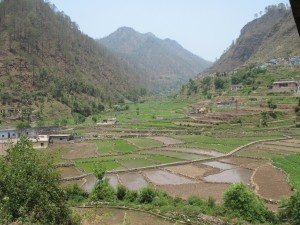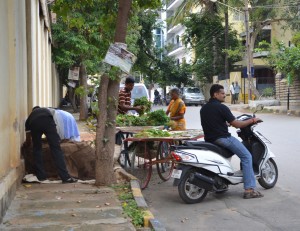
I’m pleased to introduce our second guest blogger of the summer and our first international correspondent. Kami L. Rice recently joined InterVarsity staff to work with graduate and professional students in Nashville, but she has extensive experience as a freelance writer with a large number of credits to her name. Kami is in the middle of a 4-week journey to India. She plans to connect with students and faculty while there, but she begins her series this week with reflections on a previous trip to India and on the benefits of travel to her spiritual perspective. Thank you, Kami, and welcome to the Emerging Scholars Blog! ~ Mike
Once upon a time, a missionary speaker admonished a group of gathered students, which included me, telling us that if we have any openness to going abroad as a missionary, we should go, because so many people are unwilling to go. While I think I took issue with that statement then, I definitely take issue with it now, since statements like that don’t exactly invite input from the Holy Spirit or reflect a good theology of calling and vocation.
Though I investigated every option from graduate degrees in international development to joining the Peace Corps, from missionary work to volunteering to pick French grapes, the way for me to begin the international part of my life didn’t open until my calling as a writer was firmly established. Thus, when I headed to Africa for four months in 2007 to cover writing projects for mission and humanitarian organizations, I literally went to ask questions, not to solve problems.
It was then that I fell in love with the way traveling as a writer allows me to ask questions that could normally be inappropriate to ask of new acquaintances and the way listening to their answers opens avenues for learning from people in other places.
Two years ago I came to India for the first time on a trip that happened to conclude an inaugural two-year period of extended travel abroad. That formative two years began with the seven countries in Africa and went on to include work for more NGOs (non-governmental organizations) during a month in Haiti, then three months of writing from London, before bringing me to India.

In India, though, I was traveling with a small team from my Nashville church, working with church workers in the Himalayas. I was on Indian soil for a scant six days, and I conducted nary an interview. And that’s partly why I’m so excited to be back in India this summer for nearly four weeks, writer pen in hand.
Yet, two years ago as we hiked mountain paths and visited villages with our Indian guides, I was exposed to something I hadn’t quite encountered previously: a culture whose normative civic structures are antithetical enough to Christianity that to choose to be a Christian means stepping outside those structures. My respect for Indian converts increased significantly in those six days as I gained cursory understanding of how radical it is here to choose Christ.
Our time in villages also gave me a deepened appreciation for the gospel. It was profound to meet people who had either never heard of Jesus Christ at all or had heard His name without any accompanying knowledge of who He is. They haven’t exactly chosen against the gospel so much as they’ve never heard it, even in our information saturated age.
My conviction that believers in the West need believers in the developing world also increased during that first Indian visit. We need to know and hear from each other. While most people readily accept that our Indian brothers and sisters need Westerners for our help and training, it’s equally true, but less often acknowledged, that we need them for their faith, for their courage, for the ways they experience God’s power when things like undeveloped economies and infrastructures mean they come to the end of their own power sooner than we do.
Now after a two-year hiatus from international travel, I return to India eager to explore questions that were touched off by my first visit. This time I am being hosted by friends in one of India’s southern cities instead of its northern, rural villages. Among the questions on my mind as I settle in here is whether the choice for Christ is as radical in India’s cities as it is in the country and as radical in southern India as it is in the north. I am also eager to explore further how the gospel is worked out in this culture, to learn how that will help me and others understand the gospel anew back home.

Additionally, as Eastern-informed spirituality grows more popular in the West, I have come to India interested in discovering what we can learn from Indian believers about how to interact with and speak Christ into the lives of people who have consciously or unconsciously adopted a worldview or spirituality that is increasingly similar to that found in Eastern religions.
During my first visit here, India confirmed for me what Scripture teaches about the relationship between prayer and salvation and the work of the Holy Spirit. One of my team’s prayers prior to our trip was that people would know they had heard the truth when we told them the gospel story. Our first day out on the Himalayan trails, a man we visited at his rugged mountainside farm listened closely while one of my teammates drew pictures and narrated the gospel over cups of chai. Via our Indian translator-friend, this farmer responded to the story by saying, “I know this is the truth,” the exact words we’d been praying would be his experience.
I hope to likewise be able to recognize the truth God lets me hear during this second journey into this part of God’s world. I’m glad to invite you to listen with me.
Based in Nashville, Tenn., Kami Rice (www.kamirice.com) became a fan of avocadoes in Kenya, olives in England and Italy, tilapia in Uganda, mangoes in Haiti and Indian chai in, well, India. Since 2007, she has worked full-time as a freelance writer. She also served briefly as a part-time member of InterVarsity’s Graduate & Faculty Ministries team. She’s also blogging from India at www.kami-in-africa.blogspot.com.

Hi Kami,
I really enjoyed this post, especially your point about how entering a culture as a writer allows conversations that touristing might not. Though travel hasn’t been a big part of my academic vocation, it strikes me that visiting professors probably have a similar experience of being able to approach questions that might seem too pointed for the casual traveller.
I’m from the southern indian state of kerala. The state of christianity in my native state is much like the state of christianity in the west; old, established and full of divisions between mainline denominations, catholics, orthodox and pentecostals. I would definitely recommend that people visit north India if they want to meet with people who risk their lives to follow Christ.
Hi, PeterD – From the things I’ve heard it has seemed like the experience of Christianity can vary quite a lot depending on where one is in India, so I’m really interested in learning this about Kerala. Thank you for adding this here!
Thanks for that perspective, Peter. Have you seen any differences between southern India and the West related to Christianity’s status as a minority religion in India vs. being a majority religion in the West?
Hi, Hannah! Yes, I agree with you. I’ve interviewed an applied anthropologist in the past and found some definite resonance between what I do as a writer and what he does as a researcher, but I think you’re also correct that visiting professors of any sort have some opportunity for question-asking that goes beyond what typical tourists appropriately can ask. Combining intentionality around learning with curiosity and the ability to frame good questions (all qualities of good academics!) can take folks far when they’re visiting another culture.
You used the word “nary.” I love it! Reminds me of the Andy Griffith show.
Dear Kami,
In response to your post, a faculty friend emailed me about a recent conversation regarding the influence of Hindu spirituality on American Christianity. He had a conversation with a friend currently living in India (Note: parents are medical missionaries in India). Their time together “jumped around, hitting lightly on many questions,” including Ravi Zacharias’ analysis, the lack of any saving power, and the caste system. In the end, my faculty friend is concerned about the individualistic nature of Hindu worship and wonders “what’s missing in American Christianity that makes Hinduism appealing.” Looking forward to more of your thoughts on this topic.
The child of medical missionaries feels Hinduism is a religion of rules. While a student at Harvard, my friend attended one of Paul Tillich’s classes on “Religion and Culture.” Tillich had strong leanings toward Hinduism and its pantheism. They talked about intellectuals in the university who consider themselves non-religious, but nevertheless “spiritual.” My faculty friend wonders what that involves: love for art and music, anti-materialism, pacifism, developing one’s own view of “reality” AND what’s of worth/value “to me.”
My faculty friend forwarded your post to his friend and received this reply, “Kami has done her homework, Hindu religion is a very crazy ritualistic religion, and the funny part is much of the scriptures in the “Bhagavad GÄ«tÄ” (Hindu’s holy book) is taken from the Bible, and their Holy Book prophecies about a Savior coming and saving this world, and that Savior is Christ. . . . Crazy isn’t it? That’s why so many Liberal Hindus are coming to Christ, and the others, they want to but are very afraid. The good news is God is removing the blindness out of peoples eyes, I love the Lord!
Thank-you for sharing your journey to India w/the Emerging Scholars Network. Much appreciated. The conversation is rich and relevant to campus life, particularly as I’m connected with several scholars visiting from India and others with Indian descent. Hope to see some of them tonight. AND so many in the West (including followers of Christ) are absorbing threads of Hindu spirituality. What an inspiration to the worship of the Father through digging into the Word of God as a witnessing community guided by the Spirit AND living out the Way on campus as the Body of Christ. More to say, but time to prepare for tonight’s ‘campus run.’
In Christ, Tom